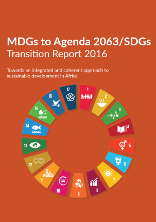MDGs to Agenda 2063/SDGs Transition Report 2016

Africa has made important strides in implementing the MDGs. Significant progress has been recorded on at least five of the eight MDGs: MDG2 – primary school enrolment; MDG3 – gender equality and empowerment of women; MDG4 – reducing child mortality; MDG6 – combating the spread of HIV and AIDS, malaria and tuberculosis and MDG7 – ensuring environmental sustainability.
On the other hand, the partial fulfillment of Overseas Development Assistance (ODA) commitments coupled with Africa’s persistently low share of Africa global trade suggests that developing a global partnership for development (MDG8) remains a work in progress. Moreover, even though maternal deaths have declined precipitously (MDG5) the levels remain unacceptably high across the continent. Meanwhile, progress on the eradication of extreme hunger and poverty (MDG 1) has been slow with reversals in some countries.
Consolidating and sustaining the progress made so far therefore remains a critical challenge for Africa. In this context, the adoption of Africa’s Agenda 2063 in January 2015 and the 2030 Agenda for Sustainable Development in September of the same year was both timely and appropriate because both agendas reaffirm the centrality of sustainability to the development discourse.
African countries have already started the hard work of implementing Agenda 2063 and 2030. However, success will require among others, strengthened capacities for integration of both agendas in national planning frameworks, effective institutional coordination and strong statistical systems to support evidenced based policymaking and follow-up.